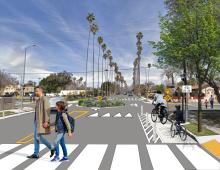
According to World Health Organization statistics, Thailand was ranked the second most lethal in the world in 2015 with 24,237 fatalities, and ninth in 2018 with 22,491 fatalities. More than 70% of these road traffic deaths were among vulnerable road users such as pedestrians and motorcyclists.
Thailand’s Department of Rural Roads (DRR) is responsible for the 47,303km road network which accounts for 10% of the country’s road network. Its vision is to enhance the technical safety standard of the rural road network by adopting “Vision Zero” principles, which take human fallibility and vulnerability into account.
With this goal in mind, DRR initiated in 2018 an ambitious project called the “Integrated Road Safety Management System Development Project”. This comprises both proactive and reactive approaches supported by capacity-building across all stakeholders to ensure safety at both project and network levels in Thailand.
The project specifically aimed to develop a comprehensive road safety management system that can identify safety problems within the existing road network and diagnose the safety deficiencies at a specific site. It then recommends potential countermeasures for effectively improving high-risk roadway segments as well as to advance capacity-building efforts across all road safety communities.
 The resulting decision support tool comprises three basic modules. First, it identifies high-risk locations based on historical crash frequency reported from the Accident Report Management System and risk scores based on the International Road Assessment Program Star Rating method. Second, it provides road asset management datasets and street view imagery for road safety experts to conduct a desktop exercise and determine road safety deficiencies prior to a site investigation. Finally, it recommends possible short-term and long-term treatments and allows decision-makers to customise a reasonable set of countermeasures
The resulting decision support tool comprises three basic modules. First, it identifies high-risk locations based on historical crash frequency reported from the Accident Report Management System and risk scores based on the International Road Assessment Program Star Rating method. Second, it provides road asset management datasets and street view imagery for road safety experts to conduct a desktop exercise and determine road safety deficiencies prior to a site investigation. Finally, it recommends possible short-term and long-term treatments and allows decision-makers to customise a reasonable set of countermeasures
Since its introduction, the road safety management system allowed the DRR to identify and diagnose high-risk locations, triggering Road Safety Audit and Road Accident Investigations to produce recommendations. Within the first two years, a total of 1,309 locations were investigated and treated. The number of accidents was reduced from 1,309-1,021 cases, while the number of fatalities was reduced by 75% from 52 to13 deaths. The project resulted in a benefit-cost ratio of 3.9 with the estimated cost of improvements standing at US$3 million against benefits from lives saved through the improvements estimated at $11.8 million. Leveraging these very encouraging results, DRR is currently pursuing a 30% reduction in road fatalities in the next five years.
Receiving the IRF Award, SakSiam Chitchop, Thailand’s Minister of Transport noted that “Technological innovation is essential in overcoming road safety problems under limited resources and inadequate solutions. Vision Zero is possible, but it will require a clear shift in road safety philosophy and technological advance.”
2021 IRF Global Road Achievement Awards
Presented during the 18th IRF World Meeting & Exhibition
The application package must include:
- A completed application form
- A project summary (<500 words)
- An explanation of how the project meets the criteria of the category in which it has been submitted (~100 words)
- Microsoft PowerPoint presentation (.ppt or .pptx) including but not limited to slides, photographs, drawings, diagrams, videos, or additional explanatory materials. (Presentations should be limited to 30 slides or less).
Additional information: www.irf.global/graa











